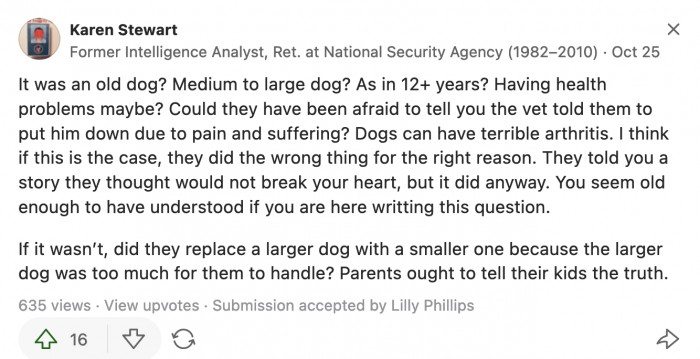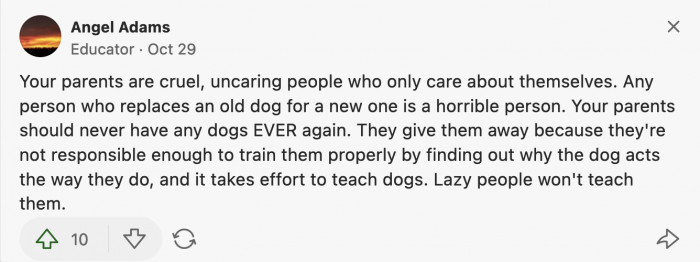Kid Asks People To Weigh In About What Happened To Their Family Dog After Their Parents Said They Took It To A Farm
A huge part of parenting is protecting children from life's harsh realities. It becomes a parent's way of ensuring their kids maintain their innocence.
There are simply some facts that are too complex for them to understand. We can't blame parents for doing what they can to prevent their kids from getting hurt emotionally.
The downside is that parents have to make up lies to explain away some complex life events. Kids can be relentless when they are curious about something.
Telling them you don't know or to ask their other parent can only work for so long. They will eventually want a tangible explanation to some extent.
To satisfy their curiosity, lies are inevitable from time to time. Telling them that Santa Claus has an infinite bag that can contain everything all at once is one of those lies.
However, some things are not as easily explained as Mr. Claus's ability to go worldwide to give each child a present on Christmas Eve. When a family pet dies, parents scramble to find an explanation for the sudden change.
We've all heard a variation of our family pet suddenly living at our aunt's or uncle's farm. When we then ask if we can visit our pet at this fictional farm, our parents will set a date that they keep rescheduling until the kids' short attention span kicks in.
This OP went through the same predicament but with the added twist of their parents replacing their old dog with a new one, later claiming the dog actually lives on a farm with other dogs.

We need more context, but OP's parents had the right intentions, at least for the dog's sake. However, they probably forgot their original lie and had to make up a new one.

Euthanizing an old pet is not an act of cruelty; vets do not advise this medical procedure unless it's absolutely necessary.

Children's Understanding of Death and Grief
Developmental psychologists explain that children's comprehension of death evolves significantly as they grow.
Young children often struggle to understand the permanence of death, leading to feelings of confusion or anxiety when faced with loss.
Understanding this developmental stage is crucial for parents and caregivers as they navigate conversations about pet loss with children.
The Psychological Impact of Family Communication
The situation surrounding a child's confusion about their family dog reflects deeper psychological themes related to communication and trust. Research shows that family dynamics play a crucial role in shaping children's understanding of reality and their emotional responses to significant events. According to Dr. Michael Thompson, a child psychologist, "Open communication within families fosters a sense of security in children, allowing them to process difficult situations more effectively." Furthermore, studies highlighted by Dr. Madeline Levine emphasize that "when parents engage in honest conversations, it significantly enhances children's emotional resilience and trust."
They tried to protect OP from the pain of losing a beloved childhood pet, but covering it up with another lie is not the way to go.

We don't have enough details to jump to all of these conclusions, but the commenter took care of that for us.

People have very strong opinions on what kind of people OP's parents are based on what they did to the old dog.

Research published in the Journal of Pediatric Psychology indicates that children often use imaginative explanations, like 'going to a farm,' to cope with loss.
This coping mechanism is a way for children to process grief in a less frightening manner.
Recognizing these patterns can help parents provide appropriate support as children navigate their feelings.
Inconsistencies in parental communication can create confusion and anxiety for children. A study from the University of Virginia emphasizes that children thrive in environments where they feel secure and informed, suggesting that clear communication is vital for their emotional well-being.
Parents should strive to maintain honesty to foster a healthy understanding of family dynamics.
I'm with the initial commenters — I don't think they really traded in the dog for a younger one; they probably had to do the inevitable and got a new dog to fill in the sudden lack of a pet at home.

This is another potential explanation. If the parents gave up on taking care of the other dog, they probably surrendered it to a shelter.

But most of the people in the comments believed that OP's parents made up the farm story to avoid telling their children that their dog is dead.

The Importance of Honest Communication
Experts recommend that parents approach conversations about pet loss with honesty while also considering the child's developmental level.
Providing age-appropriate explanations can foster a sense of security and understanding.
It's essential for parents to encourage children to express their feelings and ask questions as they process their grief.
The Importance of Transparency in Family Dynamics
Transparency in family discussions is crucial for building trust and emotional security. Research indicates that children who are included in family decisions and discussions are more likely to feel valued and understood.
As noted in psychological studies, clear and honest communication can prevent misunderstandings and promote healthier family relationships.
We are giving the parents the benefit of the doubt since we don't have enough details to say that they are bad people. If OP wants the full story, the best way to find out is to talk to their parents.

If OP wants to know what happened to their old dog, sitting down with their parents and asking for honesty is the best approach. OP just has to prepare themselves for what really happened to their dog.
Kids can be too young to learn some of life's complex truths. However, OP's inquisitive mind is better guided by their parents than by some random internet strangers who are all too ready to jump to the worst-case scenario.
To improve family communication, parents can practice open dialogues with their children, ensuring they feel safe expressing their thoughts and feelings. Engaging in family activities that promote discussion can also strengthen bonds and build trust.
Additionally, seeking the guidance of a family therapist can provide strategies for navigating sensitive topics and improving communication skills.
Psychological Analysis
This situation illustrates how parental communication significantly impacts a child's understanding of reality. When parents provide clear and honest information, it fosters trust and security, which are essential for healthy emotional development.
Encouraging open dialogue about family matters can help children feel more secure and connected to their family unit.
Analysis generated by AI
Analysis & Alternative Approaches
The emotional confusion surrounding a family pet underscores the vital role of communication in family dynamics. Research consistently highlights the importance of transparency and honesty in fostering secure attachments among family members.
By prioritizing open discussions, families can create a supportive environment that nurtures understanding and connection.
Support groups for children dealing with pet loss have been shown to be beneficial in helping them articulate their feelings.
Research indicates that shared experiences can help children feel less isolated in their grief, promoting healing and understanding.
Encouraging participation in such groups can provide a valuable outlet for children.
Analysis & Alternative Approaches
In conclusion, addressing children's understanding of pet loss requires sensitivity and honesty from caregivers.
By fostering open communication and providing support, children can navigate their feelings of grief more effectively.



